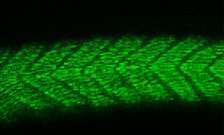Scientists from King's College London have identified a mechanism by which exercise – or lack of it – controls the growth and loss of muscle mass.
Although an early study on zebrafish, the research could provide insights into how muscle wasting can be prevented and treated in humans.
Muscle wasting is associated with extended periods of inactivity and also occurs during normal ageing. In addition, it contributes to suffering in several common diseases, such as cancer and rheumatoid arthritis.
Published in PLOS Biology, the research by Dr Orli Yogev, Professor Simon Hughes and colleagues from the Randall Division of Cell and Molecular Biophysics at King's College London, showed how muscle growth in zebrafish is regulated by the effects of physical activity on the TOR cell signalling pathway, a known regulator of cell growth in organisms from yeast to mammals. Specifically, lack of physical activity activated proteins that block muscle protein synthesis – the process through which muscles normally grow.
Professor Simon Hughes said: 'Regulation of these proteins causes the profile of muscle proteins to change, tuning the muscle to periods of activity or inactivity.
'In healthy people muscle mass is maintained through a balance between the rate at which muscle protein is synthesised and the rate at which it is broken down. In our study, this balance was disrupted, reducing muscle growth.'
Professor Hughes added: 'If the mechanism discovered by Dr Yogev is found to exist in humans, our findings could pave the way for measures aimed at preventing or even reversing muscle wasting. It might also help us understand how sport is beneficial for muscle growth in children.'
More information: www.plosbiology.org/article/info%3Adoi%2F10.1371%2Fjournal.pbio.1001679
Journal information: PLoS Biology
Provided by King's College London




















